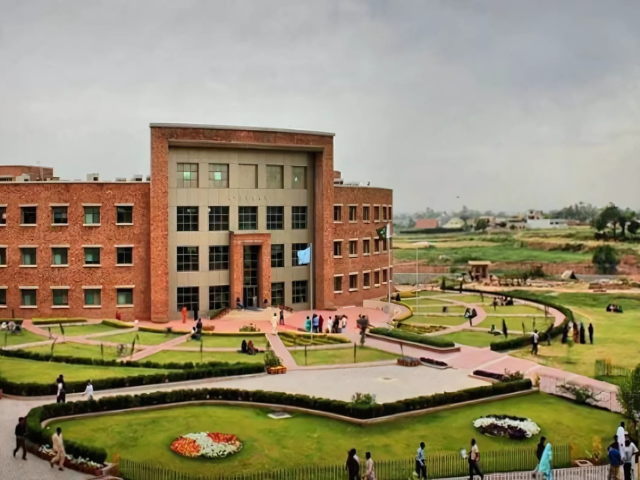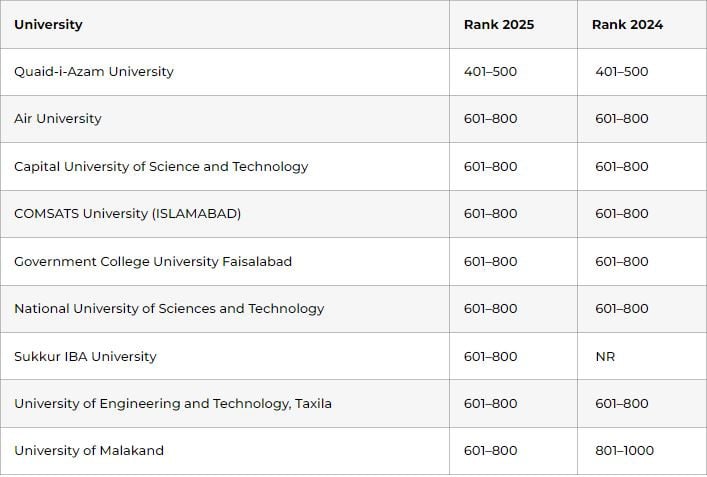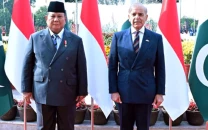World University Rankings 2025: Quaid-e-Azam University is Pakistan’s only institution in top 500
Only 94 of 266 universities recognized by HEC participated; Eight Pakistani universities in the 601-800 band.

In the recently released Times Higher Education World University Rankings 2025, Quaid-e-Azam University remains the only institution from Pakistan to secure a spot in the top 500, ranking within the 401-500 band.
This year’s rankings showcase a record 2,000 universities from 115 countries, marking a 9.7% increase from last year.
Pakistan stands out with 47 ranked universities, tying with Taiwan as the 14th most-represented nation worldwide and ranking 6th in Asia.
While Quaid-i-Azam University leads the charge, eight other Pakistani universities fall within the 601-800 band, including Sukkur IBA University—a newcomer to the rankings—and the University of Malakand, which has improved its position after moving up from the 801-1,000 range.

However, the rankings indicate challenges, as only seven universities improved their standings, while ten saw declines.
Among the institutions in the 601-800 band are prominent names like NUST, COMSATS Islamabad, Air University, GCU Faisalabad, Capital University, UET Taxila, and the University of Malakand.
Additionally, thirteen universities were ranked between 801 and 1000, including LUMS, Arid Agriculture University, Islamia University, UET Peshawar, and others.
With 266 universities recognized by the Higher Education Commission (HEC), only 94 participated in the rankings.
Statistically, at least 17 Pakistani universities should ideally rank among the top 500, yet only Quaid-e-Azam University has achieved this distinction.
The Times Higher Education Rankings assess research-intensive universities based on 18 performance indicators, including teaching, research, knowledge transfer, and internationalization.
This year, 2,860 institutions submitted data, reflecting a 6.9% increase from the previous year. The rankings have evolved significantly since their inception, making them the most comprehensive and inclusive global university evaluation system.
Only five Indian universities have made it into the top 500 of this year's global rankings, notably excluding any of the prestigious IITs, which has raised concerns about the credibility of the Times Higher Education (THE) rankings.
In contrast, twelve universities from the Gulf region have secured places in the top 500. Among these notable entries are King Fahd University of Science and Technology at 176th, Abu Dhabi University at 191st, and King Saud University, Khalifa University, and Qatar University ranked in the 201-250 range.
Additionally, UAE University and Prince Mohammad bin Fahd University are positioned between 251-300, while King Khalid University and the University of Sharjah fall within the 301-350 band.
Times Higher Education (THE) and QS (Quacquarelli Symonds) are widely recognized as leading global ranking platforms, attracting participation from numerous institutions each year.
These rankings primarily evaluate universities based on three core criteria: research, teaching, and societal impact. Institutions are required to submit comprehensive profiles that include data on faculty-to-student ratios, gender distribution, and the percentage of international students.
Some universities go a step further by providing enhanced profiles to showcase unique strengths beyond standard metrics. However, it is important to note that the data submitted is neither verified nor audited by THE or QS.
The University of Oxford has clinched the top spot for the ninth consecutive year, setting a new record by surpassing Harvard's eight-year dominance, which ended in 2011.
Oxford stood out among the top ten institutions for its strong international outlook, particularly in relation to the proportion of international students and collaborative research efforts with global partners.























COMMENTS (2)
Comments are moderated and generally will be posted if they are on-topic and not abusive.
For more information, please see our Comments FAQ